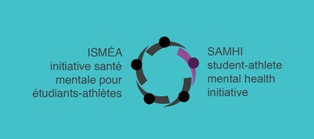 Through their own experiences, two female athletes in Ottawa recognized the need to provide mental health services to student athletes. Subsequently, Samantha DeLenardo and Krista Van Slingerland launched the Student Athlete Mental Health Initiative (SAMHI) on Twitter and Facebook. The aims of the initiative are to connect student athletes with local counseling services and resources as well as advocate for student athletes’ mental health.
Through their own experiences, two female athletes in Ottawa recognized the need to provide mental health services to student athletes. Subsequently, Samantha DeLenardo and Krista Van Slingerland launched the Student Athlete Mental Health Initiative (SAMHI) on Twitter and Facebook. The aims of the initiative are to connect student athletes with local counseling services and resources as well as advocate for student athletes’ mental health. 
The initiative was borne from Van Slingerland’s time during third year of university. Like most students, she experienced personal, academic and social pressures. But as a basketball player for the Carleton University women’s team, she faced additional demands. Eventually, the pressure to succeed greatly affected her well-being, causing her to withdraw from the team. Although VanSlingerland is planning to return, she believes that had she had more support, she wouldn’t have had to take a break from basketball. Van Slingerland’s co-started SAMHI to give other student athletes access to the mental health support that she didn’t have.
Co-founder DeLanardo played hockey for the University of Ottawa women’s team. She hopes that SAMHI will shift the university sports culture to better meet the needs of student athletes with mental health issues. She’s partnering with mental health advocates to raise awareness of the project.
CMHA also addresses the mental health of post-secondary students, both athletes and non-athletes alike. CMHA leads the Centre for Innovation on Campus Mental Health (CICMH), in partnership with Colleges Ontario, the Council of Ontario Universities, the College Student Alliance and the Ontario Undergraduate Student Alliance.
 The project is funded by the Ministry of Training, Colleges and Universities and the goals of the project include the creation of a Community of Practice (CoP) to connect a broad cross-section of stakeholders in Ontario. This includes student leaders, service providers, faculty, administrators and community agencies.
The project is funded by the Ministry of Training, Colleges and Universities and the goals of the project include the creation of a Community of Practice (CoP) to connect a broad cross-section of stakeholders in Ontario. This includes student leaders, service providers, faculty, administrators and community agencies.
Community of practice members, through their interactions and relationships, can share knowledge and experiences, best and promising practices, address challenges, collaborate and address gaps in knowledge, research and practice.
The CoP also facilitates access to community-based expertise and provide professional development to enhance capacity to meet the needs of students with complex mental health and addiction concerns.
Another goal of the CICMH is to identify innovative ideas and approaches that address gaps and enhance practice in student mental health services and programs.
For more information about the Centre for innovation in Campus Mental Health, please visit the website or contact info@campusmentalhealth.ca.